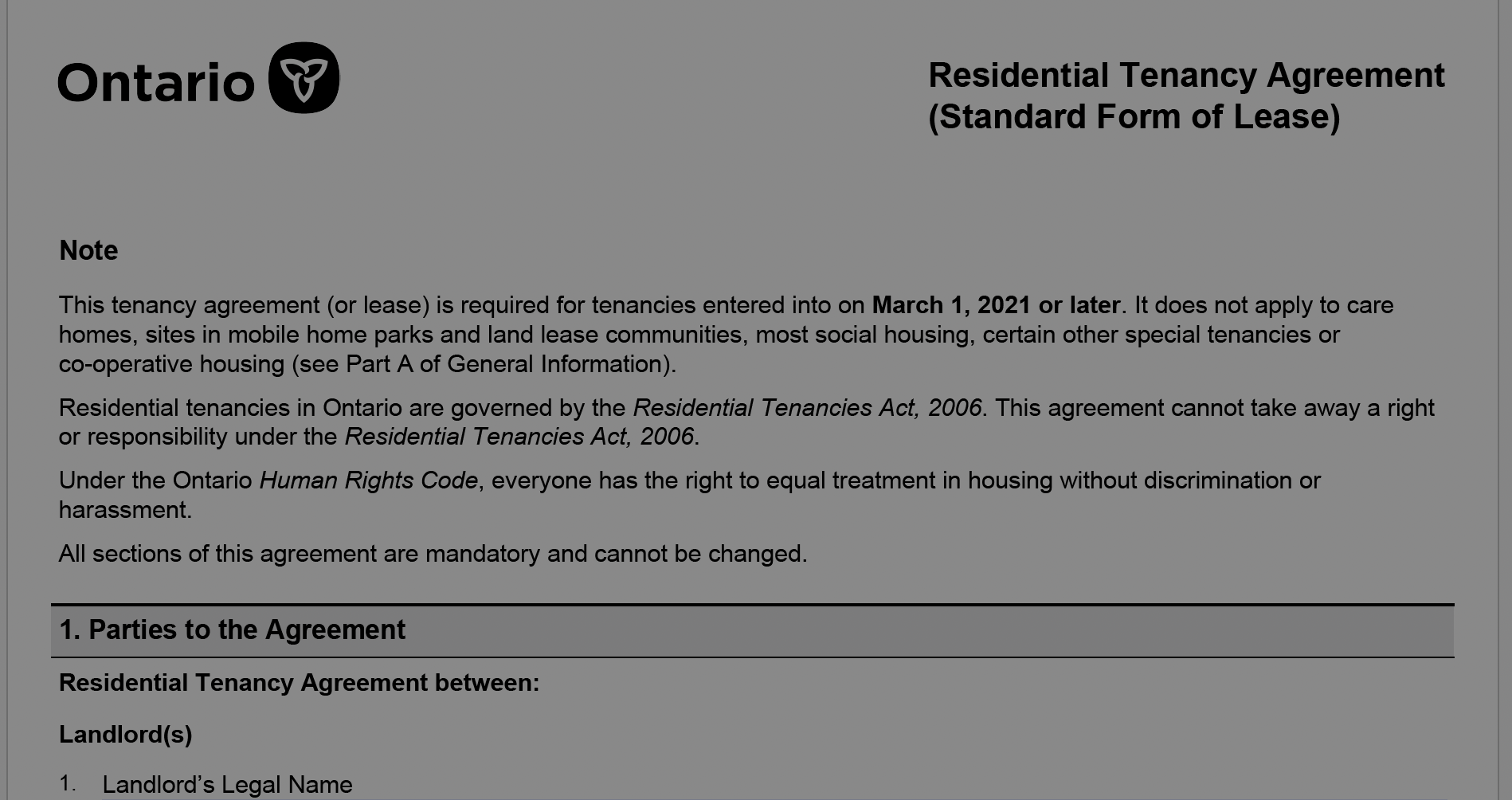What is the Ontario Standard Lease Agreement?
A standardized form of lease, mandated by the Ontario Government for most residential lease agreements in Ontario. The clauses within the lease are aligned with the Residential Tenancies Act.
What you should know about the Ontario Standard Lease Agreement:
- It’s mandatory for residential leases signed after April 30, 2018.
- The Tenant must receive a signed copy of the lease within 21 days of signing.
- The OREA Agreement to Lease (Form 400), used if you advertise the property on MLS through a Realtor, is not a valid form of Lease in Ontario. It must be accompanied by the Ontario Standard Lease.
- Additional terms can be added to the agreement, as long as the terms do not contravene the Residential Tenancies Act.
Why is a standardized lease agreement a good thing?
- Reduces confusion and misinterpretation often associated with tenancy law.
- Reduces risk for Landlords by keeping them compliant with tenancy law.
- Protects Tenants against unlawful lease clauses.
- Clarifies obligations and responsibilities of Landlords and Tenants alike.
- Provides an easy-to-use, legally compliant Lease Agreement for small Landlords.
The Ministry of Municipal Affairs and Housing publishes a comprehensive guide to the Ontario Standard Lease. It’s a quick read and provides loads of valuable information about key clauses within the lease agreement and the associated legislation within the Residential Tenancies Act. In our opinion, the guide should be required reading for Landlords and Tenants alike!
Overview of Key Sections of the Lease Agreement
Section 3 – Contact Information
Landlords and Tenants can agree to send and receive notices by email, where permitted by Landlord and Tenant Board rules.
Section 9 – Key Deposit
Landlords are permitted to collect a refundable Key Deposit.
Section 10 – Smoking
Ontario law prohibits Smoking in common areas, but not individual units. Smoking rules for individual units must be added to the Lease by the Landlord and agreed to by the Tenant.
Section 11 – Tenant Insurance
The Landlord can require that liability insurance is obtained by the Tenant. The Tenant must provide proof of coverage if requested by the Landlord. Obtaining content insurance is optional for the Tenant.
Section 12 – Changes to the Rental Unit
Tenants are permitted to make minor alterations, such as hanging pictures and window coverings, but must have Landlord approval for any other alteration.
Section 13 – Maintenance and Repairs
This section explains that the landlord must maintain the rental unit and property, but the tenant must repair or pay for any undue damage caused by the tenant or their guests. The tenant is responsible for keeping the unit clean, unless the landlord agreed to do so.
Section 14 – Assignment and Subletting
This section explains that the tenant needs the landlord’s permission to assign or sublet the unit to someone else, and that the landlord cannot arbitrarily or unreasonably withhold consent.
Section 15 – Additional Terms
The Landlord and Tenant can agree to additional terms not covered in the Ontario Standard Lease, assuming:
Any additional term which attempts to take away a right or responsibility under the act is void (not valid or legally binding) and cannot be enforced. Some examples of void and unenforceable terms include those that:
- Do not allow pets (however, the landlord can require the tenant to comply with condominium rules, which may prohibit certain pets.)
- Do not allow guests, roommates, any additional occupants Part 1: Sections of the standard lease 8.
- Require the tenant to pay deposits, fees or penalties that are not permitted under the act (for example damage or pet deposits, interest on rent arrears).
- Require the tenant to pay for all or part of the repairs that are the responsibility of the landlord.
Additional terms should be written in plain language and clearly set out what the landlord or tenant must or must not do to comply with the term. If typed, the additional terms should be in a font size that is at least 10 points.
We would suggest having your ‘Additional Terms’ vetted by an experienced Paralegal, to ensure that they do not contravene the Ontario Residential Tenancies Act.
Landlords and Tenants alike should get to know the Ontario Standard Lease, as it forms the foundation of the Landlord/Tenant relationship. You can download the agreement and guide below:
Download the Guide to the Ontario Standard Lease here:
https://files.ontario.ca/mmah-guide-to-standard-lease-for-rental-housing-en-2022-04-19.pdf





